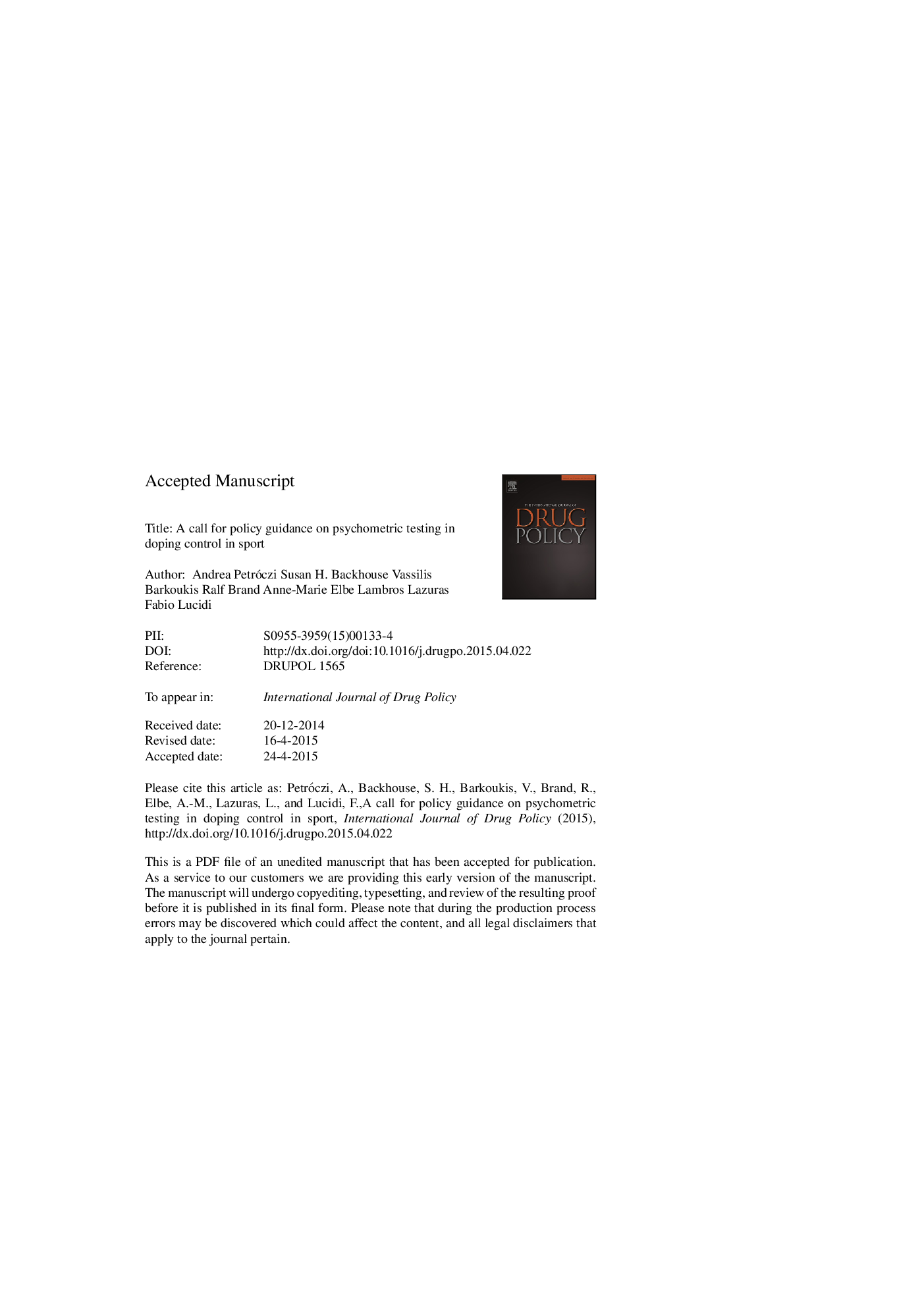| کد مقاله | کد نشریه | سال انتشار | مقاله انگلیسی | نسخه تمام متن |
|---|---|---|---|---|
| 7513157 | 1486280 | 2015 | 41 صفحه PDF | دانلود رایگان |
عنوان انگلیسی مقاله ISI
A call for policy guidance on psychometric testing in doping control in sport
ترجمه فارسی عنوان
تماس جهت راهنمایی سیاستی در مورد آزمایش روان سنجی در کنترل دوپینگ در ورزش
دانلود مقاله + سفارش ترجمه
دانلود مقاله ISI انگلیسی
رایگان برای ایرانیان
کلمات کلیدی
افزایش عملکرد ممنوع ورزشکار دارو، ضد دوپینگ، نگرش،
ترجمه چکیده
یکی از چالش های اساسی در زمینه ضد دوپینگ شناسایی ورزشکاران است که از مواد افزایش دهنده عملکرد ممنوع استفاده می کنند یا در معرض خطر هستند. روند رو به رشد استفاده از رویکرد قانونی در مورد کنترل دوپینگ، هدف قرار دادن اطلاعاتی از علوم اجتماعی (مثلا روانشناسی دوپینگ) در سازماندهی اطلاعات برای حفاظت از ورزش پاک است. فراتر از عواقب پیش بینی شده از شناسایی مثبت به عنوان یک کاربر دوپینگ، این وظیفه به دلیل اختلاف بین آنچه که در قانون جهانی ضد دوپینگ به رسمیت شناخته شده است، پیچیده است و در تحقیقات دوپینگ به کار گرفته می شود. در حالی که روانشناسی نقش مهمی در توسعه درک ما از رفتار دوپینگ دارد تا اطلاع رسانی به مداخله و پیشگیری، نقش آن در مجموعه ابزارهای تشخیصی دوپینگ هنوز در دوران پس از زایمان است. در هر دو روش تحقیق و قانونی، باید اذعان داشته باشیم که (1) پاسخ اجتماعی مطلوب، نتایج آزمایش های روان سنجی خود را گزارش می دهد و (2) پیچیدگی شناختی در اطراف عملکرد تست به این معنی است که اندازه گیری زمان پاسخ پاسخ و آزمون آشکارساز دروغ برای نشان دادن حوادث زندگی پنهان (به عنوان مثال، استفاده از دوپینگ) مستلزم نتایج حاصل از غلط یا غیر قابل تفسیر در تنظیمات زمینه هستند. تفاوتهای ویژگیهای اجتماعی شناختی رفتار دوپینگ که در سطح گروه آزمایش می شوند (کاربران دوپینگ و غیر از کاربران) نمی توانند به افراد منتقل شوند؛ نه این اقدامات روان سنجی مورد استفاده برای تشخیص فردی. در این مقاله، ما یک بیانیه موضع گیری برای راهنمایی های سیاست گذاری در مورد استفاده مناسب از ارزیابی های روان سنجی در پیگیری ورزش تمیز ارائه می دهیم. ما استدلال می کنیم که تا به امروز، آزمون های روان سنجی مبتنی بر خود گزارش شده و زمان پاسخ دهی برای دوپینگ، طراحی شده، مورد آزمایش و اعتبار قرار گرفته اند تا کشف کنند که چگونه ورزشکاران احساس و فکر می کنند در مورد دوپینگ به منظور درک بهتر رفتار دوپینگ، نه ایجاد شواهدی برای دوپینگ یک پروفایل روانشناختی «مثبت» دروغین برای دوپینگ، نه تنها به نفع فردی «تمیز»، بلکه همچنین همراهانش، سازمان و ورزش خود را نیز تحت تاثیر قرار می دهد. هدایت سیاست های پیشنهادی با هدف محافظت از جامعه ورزشی جهانی در برابر پیامدهای اجتماعی، اخلاقی و حقوقی از سوء استفاده از تست های روانشناختی، از جمله برنامه های نامناسب و بی کفایتی به عنوان ابزار تشخیصی قانونی در هر دو تمرین و تحقیق، محافظت می کند.
موضوعات مرتبط
علوم پزشکی و سلامت
پزشکی و دندانپزشکی
روانپزشکی و بهداشت روانی
چکیده انگلیسی
One of the fundamental challenges in anti-doping is identifying athletes who use, or are at risk of using, prohibited performance enhancing substances. The growing trend to employ a forensic approach to doping control aims to integrate information from social sciences (e.g., psychology of doping) into organised intelligence to protect clean sport. Beyond the foreseeable consequences of a positive identification as a doping user, this task is further complicated by the discrepancy between what constitutes a doping offence in the World Anti-Doping Code and operationalized in doping research. Whilst psychology plays an important role in developing our understanding of doping behaviour in order to inform intervention and prevention, its contribution to the array of doping diagnostic tools is still in its infancy. In both research and forensic settings, we must acknowledge that (1) socially desirable responding confounds self-reported psychometric test results and (2) that the cognitive complexity surrounding test performance means that the response-time based measures and the lie detector tests for revealing concealed life-events (e.g., doping use) are prone to produce false or non-interpretable outcomes in field settings. Differences in social-cognitive characteristics of doping behaviour that are tested at group level (doping users vs. non-users) cannot be extrapolated to individuals; nor these psychometric measures used for individual diagnostics. In this paper, we present a position statement calling for policy guidance on appropriate use of psychometric assessments in the pursuit of clean sport. We argue that, to date, both self-reported and response-time based psychometric tests for doping have been designed, tested and validated to explore how athletes feel and think about doping in order to develop a better understanding of doping behaviour, not to establish evidence for doping. A false 'positive' psychological profile for doping affects not only the individual 'clean' athlete but also their entourage, their organisation and sport itself. The proposed policy guidance aims to protect the global athletic community against social, ethical and legal consequences from potential misuse of psychological tests, including erroneous or incompetent applications as forensic diagnostic tools in both practice and research.
ناشر
Database: Elsevier - ScienceDirect (ساینس دایرکت)
Journal: International Journal of Drug Policy - Volume 26, Issue 11, November 2015, Pages 1130-1139
Journal: International Journal of Drug Policy - Volume 26, Issue 11, November 2015, Pages 1130-1139
نویسندگان
Andrea Petróczi, Susan H. Backhouse, Vassilis Barkoukis, Ralf Brand, Anne-Marie Elbe, Lambros Lazuras, Fabio Lucidi,
